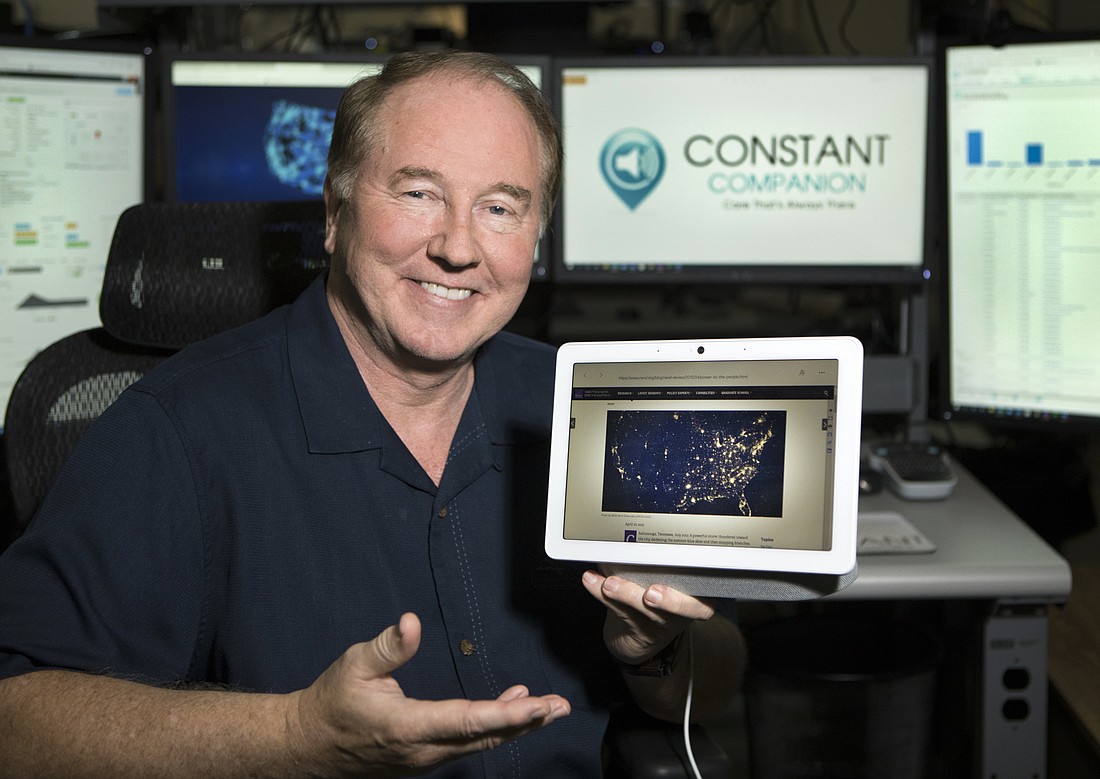- December 13, 2025
-
-
Loading

Loading

A few years ago, Mark Gray’s mother fell and broke her ankle while at home by herself. Like many others in this position, Gray worried that if it happened again his mother might not be able to reach help.
He tried to get her to wear an alert button around her neck. When that didn’t pan out, he took another tact: he created his own business and product, now called Constant Companion.
“I wasn’t trying to start a business,” he says. “I was just trying to protect my mom.”
Gray says that since the push button technology — famous for the I've fallen and I can't get up tagline — is around 40 years old, he knew immediately the technology needed to be brought up to date. That's why Constant Companion, based in Sarasota, uses voice assistant technology to provide seniors a better outlet to call for help. Behind a multimillion-dollar investment, Gray now has big plans to grow Constant Companion the health care and related sectors.
Gray considered all factors when designing the product, starting with customers with soft voices. In 2018, he filed for a patent. Then he took the product to beta testing. The Constant Companion now serves over 100,000 people; Gray declines to disclose revenue numbers.
The core of Constant Companion, Gray says, is the technology bridges the gap between when a human caregiver is available and when they’re not. That goes all the way to the oldest user — who is 101 years old. Other users include relatives, home care agencies and senior communities.
The Constant Companion speaker connects with users’ phones, which allows them to call anyone in their contacts. The speaker is designed to pick up voice cues from anywhere in the home.
Since 2018, the company has had zero reported falls where the person couldn’t call for help. “It’s worked every time,” Gray says.
When a person falls, the companion connects them with the company’s care response center within 10 seconds. Then a person from the 24/7 center stays on the line with the user until help arrives.
Gray says this technology is so much better than the wearable technology because studies have shown that many seniors weren’t wearing the pendant when they fell. “If you don’t have it on, it won’t help you,” Gray says.
Gray even says the Constant Companion was helpful in an unexpected way during the pandemic.
With the majority of the products’ customers staying at home, and not getting to visit family in fear of getting sick, a lot of seniors reported feeling lonely and depressed. “The power of Constant Companion is it keeps your mind engaged so you feel more connected,” he says.
The product is designed similarly to a smart speaker so it’s able to answer questions or even tell a joke.
After just eight weeks with the product, users reported feeling a sort of kinship with the smart speaker. “They feel like they have a roommate,” Gray says.
The company’s No. 1 user, or the user who speaks to the speaker the most, talks to their Constant Companion an average 72 times a day. Gray notes that this customer is bed bound so they were able to set up the speaker to help lock the doors and turn on the lights when needed.
The future for Constant Companion is studying the impact it has on older adults. Gray adds he and his team are looking into whether it lowers the risk of Alzheimer's disease and dementia by keeping the brain more engaged.
Gray recommends one speaker per 1,000 square feet. He says that about 80% of falls happen in the bathroom. With this in mind, the company includes a wall plug for the bathroom.
The most challenging part of creating a smart speaker for older adults was privacy. “They’re nervous about the smart speaker listening to everything they say,” Gray says.
But Gray, with years of cybersecurity experience in the White House, Pentagon and NASA, among other areas, uses military-grade technology to ensure privacy. Gray’s technology even limits telemarketing calls.
The technology doesn’t sell users’ information to marketing or advertising companies. Additionally, every user is assigned an anonymous identity. Gray has spent more than $1 million to ensure every user remains private.
Another challenge that’s popped up is that not everyone has a smartphone and/or Wi-Fi. The systems are fully programmed with Wi-Fi, which helps.
Gray says the company is growing rapidly in the health care sector, more specifically in telehealth. With the military-grade encryption for security, the product is also HIPAA compliant.